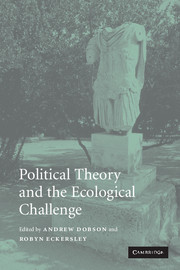5 - Nationalism
Published online by Cambridge University Press: 06 July 2010
Summary
It is widely accepted that the planet's ecosystems are under threat: there are unbearable levels of pollution, development often does not take account of environmental protection, a growing number of species are becoming extinct, and so on. Let us call the attempt to change or stop this tendency the ‘ecological challenge’. In this chapter I ask two questions. To what extent do the ecological challenge and nationalism conflict? And if they do, is preventing environmental degradation a reason to restrict the quest for nationality? In order to discuss these questions I first define nationalism. I then discuss three reasons why nationalism might work in favour of protecting the environment. However, I also suggest four reasons why ecological protection and nationalism do not tie in with each other. I claim that these four reasons override the first three, and so if one accepts that the ecological challenge is urgent it should have priority over nationality. However, this should not imply that those who already enjoy national self-determination could restrict the quest for nationality among those who do not.
I should start, though, by clarifying my use of the term ‘nationalism’. In general it is an ideology that puts forward both empirical and normative claims. The empirical ones are that people do regard themselves as members of communities that are defined as nations, based on some ethnic coherence, a shared history, customs and traditions, often a common language and shared values.
- Type
- Chapter
- Information
- Political Theory and the Ecological Challenge , pp. 75 - 90Publisher: Cambridge University PressPrint publication year: 2006
References
- 6
- Cited by



